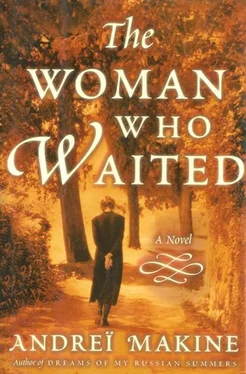I leaf through the pages, I express my admiration for the engineer: born in a tiny village on the White Sea, he is now the designer of a space communications system! The insistence of Zoya’s stare makes me uneasy. She glares at me with condescending hostility, as much as to say: All right, stop your idle chatter and let’s cut to the chase. I fall silent, she turns the page, points at one of the photos.
An elderly man, photographed with his two granddaughters, as the caption explains. A round, fleshy face, a fatherly expression. His jacket is weighed down by the broad disks of several decorations. “A typical Soviet apparatchik/’ I say to myself, and the caption tells me that this is a certain Boris Koptev, party committee secretary in a big Moscow factory…
“It’s him.”
Zoya’s voice betrays a sudden breathless weakness. She recovers at once and repeats in the firm tones of a verdict: “Yes, that’s him, all right… The man Vera’s been waiting for all her life…”
Her story is concise, and I feel as if I am listening to it with my whole body. It reverberates like a blow, like a fall, like a shock wave, leaving no space within me, nothing untouched.
The final battles of the war before Berlin’s outer defenses: that day dozens of men fall from a pontoon gutted by an explosion. Soldiers from the corps of engineers engaged in preparing for crossing the Spree River. Among these bodies torn to shreds, drowned, is that of Boris Koptev. News of his death is conveyed to the next of kin in a terse notice, a standard form of which millions of copies were printed: “Reported missing in action… Died a hero’s death.” His only remaining next of kin is his mother, soon to be carried off in the famine of 1946. And also this strange fiancée, who will retain, like a holy relic, that earlier death notice (sent in error, as the military authorities later inform her) in which the soldier was described as “reported missing in action.” And so the waiting can begin.
But what also begins is a new life for Koptev, freshly discharged from the hospital: repatriation, celebrations in Moscow, the heady sensation of being the victorious hero, acclaimed at every step, the host of female faces beaming at him, all those women ready to give themselves to men still whole and free, as he is, to these male survivors, now so rare… Once an obscure young kolkhoznik, he has become a glorious defender of the Fatherland; once a clodhopper directed to remain in his hamlet in the far North like a serf, now he is taken to the capital, where his medals open the doors of the university to him, guarantee him a career, erase his rustic past. It is only this past he dreads. On the road back from Berlin to Moscow he saw villages in Byelorussia in a state of devastation, peopled by starving ghosts, walking wounded, and children with rickets. Anything but that! He wants to stay among the victors.
Zoya has already been gone a moment. Her story is still unfolding in my mind, a sequence of facts easy to imagine, familiar from so many other eyewitness accounts, embodied by so many men and women I have encountered since childhood. A soldiers return. The era I was born in was entirely devoted to this dream, the joy of it, its ruination.
Did he ever chance to think of Mirnoe, of the love he had left behind amid the soft and weary snows of April? Very rarely, in all likelihood. Such was the shock of discovering Europe, for one who had never before seen a city and multistoried houses. And then Moscow, a powerful drug of novelties, a fabulous stimulant of temptations. It was not that he forgot, no, he quite simply no longer had time to remember.
As she was leaving, Zoya paused on the threshold, looked me straight in the eye, and declared: “So that’s how it’s been, our history,” adding, in almost severe tones: “Our history, for us here…” Her tone excluded me, calmly but definitively, from this history. Only the previous day, such a rejection would have pained me, I was feeling well and truly rooted in Mirnoe. Now I am relieved by it. Incautious rambler that I am, I have strayed into the rear of an ancient war.
After Zoya has left, I embark several more times on reconstructing Koptev’s life, picturing the thirty years that have turned him into this tranquil grandfather and worthy Party functionary. Then comes the moment when I realize I am thinking about him so as not to think about Vera. And I realize I have neither the courage nor the powers of reasoning now needed to imagine the feelings of this woman who has spent her whole life waiting for a man. Emptiness, pained amazement, timid fury, nothing more.
It is very cold. I go outside in search of logs piled up beside a shed. The sky is an icy purple; the mud beneath ones feet resonates, a harbinger of frost. The wood rings out too, like the notes on a keyboard. I prepare to go inside, but suddenly at the end of the street I see the beam of a flashlight slowly zigzagging over the ruts in the road. Vera… I step back, squeeze into the shadow against the timbers of the izba .
It seems I need this humiliating fear to make me understand what this woman is now. A voice, the same sordid little voice that was congratulating itself over my having “slept with” such a woman, cries out within me: “Now she’s going to cling to you!” Taking the moral high ground, we consign this voice to the outer periphery of our consciousness, amid the slime of our instincts. Doubtful, this. For often it is the first to make itself heard, and is very like us.
The flashlight beam sways gently, drawing inexorably closer to my hiding place. Obviously she is coming to see me, she wants to talk to me, unburden herself, share her grief, weep, be comforted by the man who… All at once, I realize that for this woman I am now the person I have become since last night. I am possibly the only man she has known since the departure of the soldier. She no longer has anyone in her life. Her footprints in winter, in this street. In her izba the window from which you can see the crossroads, the mailbox. She no longer has anything or anybody to wait for. So, me!
The spray of light spills over the front steps to my house, passes within a yard of my feet. She is going to knock on the door, sit down, settle in for an interminable conversation interrupted by sobs, embraces I shall not have the courage to resist, the extortion of promises. It will all be hideously false and perfectly real, brimming with harsh, pure truths about her ruined life. She needs help a thousand times more than the old women she looks after.
The advancing beam does not slow down, passes my house, moves away She must be going to prepare wood and water for a bath, so one of the old women can take it tomorrow. This domestic observation gives me a breathing space but only at the surface of my fear. Deep down, the obscene little voice is on the alert: “She’ll call and see you on the way back. She’ll settle down, probably keep quiet, play the part of the woman who has complete faith in your honor. You’re cornered. She’ll come and see you in Leningrad. She’ll cling to you like a leech. The love of older women. Especially a woman like that. In her eyes, you’ll take the place of the other one. You already are the other one she thought she was waiting for…”
I go in, light the fire but prefer to stay in the dark. All the little stove door lets through is a glowing strip of pink. If someone (someone!) comes, I shall pretend to have gone to bed already.

In reality, it all happened differently The minute-by-minute reconstruction, the timed storyline of that night of cowardice was put together much later, in those moments of painful honesty when we meet our own gaze, one more pitiless than either the scorn of others or the judgement of heaven. This gaze aims straight and shoots to kill, for it sees the hand (mine) cautiously lowering the latch on the door, the fingers cradling the metal to avoid any kind of click, the door locked-in this village where bolts are never shot. The electric flashlight beam once more sweeps through the darkness, traveling up the street. I withdraw, cock my ear. Nothing. The one whose fate I dread sharing disappears into the darkness.
Читать дальше













